2025
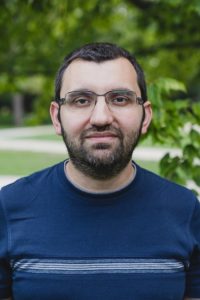
Dr. Burak Hatinoglu is a Visiting Assistant Professor in the Department of Mathematics working with Ilya Kachkovskiy. He earned his Ph.D. in Mathematics from Texas A&M University in 2020, under the supervision of Alexei Poltoratski, with a dissertation titled “Complex Analytic Approaches to Inverse Spectral Problems”. Prior to his current position, he served as a Visiting Assistant Professor at the University of California, Santa Cruz, and at the Georgia Institute of Technology, where he collaborated with Svetlana Jitomirskaya.
Dr. Hatinoglu’s research lies at the intersection of analysis and mathematical physics, focusing on spectral theory, complex function theory and potential theory. A central theme in his research is the mathematical theory of quantum mechanics, particularly the spectral analysis of quantum systems with complex or aperiodic structure. His work includes studies on inverse spectral problems, Jacobi operators, and quasi-periodic Schrödinger operators. He has authored eleven publications in these areas, contributing to journals such as the Journal of Spectral Theory, the Canadian Mathematical Bulletin, and the Proceedings of the American Mathematical Society.
In addition to his research, Dr. Hatinoglu is active in teaching and mentoring. In his previous institutions, he taught classes ranging from freshmen to upper-level undergraduate and graduate courses and mentored first year graduate students and organized undergraduate research projects. At Michigan State University, he teaches courses including Calculus I (MTH 132) and Survey of Calculus (MTH 124). He is also a mentor for undergraduate research through the SURIEM REU program.
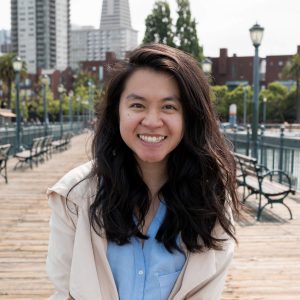 Dr. Vicky Phun is a research associate in the Physics Education Research Lab (PERL) since 2023. She received her PhD in the Educational Psychology and Educational Technology program at MSU before transitioning to the PERL where she is currently advised by Dr. Rachel Henderson and Dr. Vashti Sawtelle.
Dr. Vicky Phun is a research associate in the Physics Education Research Lab (PERL) since 2023. She received her PhD in the Educational Psychology and Educational Technology program at MSU before transitioning to the PERL where she is currently advised by Dr. Rachel Henderson and Dr. Vashti Sawtelle.
Throughout her time in PERL, she mentored five undergraduate students (including one Physics Research Experience for Undergraduates program student) and six graduate students.
Dr. Vicky Phun had thoughtful mentors who simultaneously supported her academic goals and well-being and seeks to emulate those values with her students. She believes in the power of building a relationship with her students through creating a safe space that allows students to voice their ideas and concerns, as well as the power in collaborating on processes with students.
She has mentored undergraduate students in presenting their first research posters at the Mid- Michigan Symposium for Undergraduate Research Experiences and helped them move forward on their career paths such as becoming a teacher or pursuing graduate school in their related field. She has been a co-author on posters and talks highlighting the importance of a peer mentoring program for transfer students. Additionally, she mentored students in different doctoral stages from the brainstorm of research ideas through the technical support of writing of a dissertation.
She is also an active supporter of a peer-mentoring program designed for transfer students called the Transfer Experience Mentoring Program (TEMPO) at MSU. She works with the program coordinator (who is a graduate student) and undergraduate lead mentors in designing materials on mentoring, collaborating with mentors on mentoring discussions, and building relationships with mentees and mentors in the program through weekly gatherings. She relies on their expertise in the transfer process and uses her role to elevate their voices and assist with institutional knowledge and resources to achieve the program’s goals.
Her time as postdoc in the PERL has provided her with many opportunities to learn (and even unlearn) as a mentor and is thankful for the students she works with in building trust and growing together.
2024
Dr. Trine Andersen
2023
Dr. Norman Scheel
2022
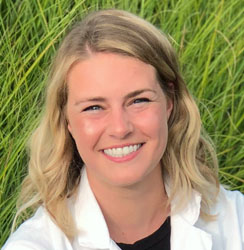
Dr. Alexandra Yaw received her Ph.D. in Biomedical Sciences-Neuroscience from Kent State University in May 2019, after graduating with a B.A. in Psychological Science and minors in Cell and Molecular Biology and Chemistry from Albion College in 2014. In June 2019, she joined MSU’s Department of Animal Science as a Research Associate in the laboratory of Dr. Hanne Hoffmann, where her research focuses on light and the neuroendocrine control of reproductive function and wellbeing.
Much of Dr. Yaw’s passion for teaching and mentoring stems from the impact that supportive mentors have played in her career path. As a former undergraduate researcher, Dr. Yaw especially enjoys working with undergraduate students to develop their own individual research projects. Thus far at MSU, Dr. Yaw has been a primary mentor for 5 undergraduate students (1 graduated, 3 current MSU undergraduate students, 1 current Bridge to PhD in Neuroscience (BPNP) scholar). Dr. Yaw strives to provide learning environments in both the research laboratory and classroom that not only allow students to develop laboratory techniques and professional development skills, but also foster growth in critical thinking and collaboration. Dr. Yaw encourages her students to be engaged in presenting their work at conferences and the writing of peer-reviewed manuscripts for publication. To date, Dr. Yaw has been a co-author on 6 poster presentations first-authored by her undergraduate students at university-wide symposia (1 student received first prize for her presentation at UURAF 2021) and each of her mentees is either published as a co-author on a peer-reviewed paper, or listed as a co-author on a research article in preparation.
In addition to helping her students develop as researchers, Dr. Yaw places an emphasis on continually building her teaching and mentoring skills. She has completed several MSU-sponsored seminars, mentor and STEM education training courses, and was named a “Postdoctoral Teaching Scholar” in 2021. Dr. Yaw is also involved in MSU classroom instruction as a guest lecturer and engages in community elementary school outreach through in-person and virtual classroom visits focused on science careers and inquiry-based lab activities on light and its impact on health and behavior.
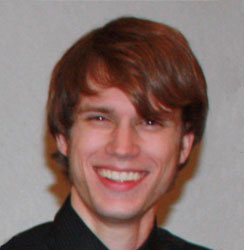
Dr. Christopher Buehl received his PhD with Dr. Min-Hao Kuo at Michigan State University in 2017 before joining Dr. Katheryn Meek’s lab in the Department of Microbiology and Molecular Genetics.
Dr. Buehl has benefitted greatly from excellent mentorship in his training and believes strongly in ensuring that the next generation of aspiring scientists are encouraged and supported. He has helped to mentor undergraduate researchers throughout his time at Michigan State. Dr. Buehl has been an instructor for MMG 409 for two semesters. The course is designed to teach undergraduates cell biology through active learning by focusing on critical thinking, data interpretation, and a mechanistic understanding of cellular biology. This approach, while challenging with a class of over 200 students, has been successful in forming a lasting understanding of the material covered.
Dr. Buehl is also an active mentor within the laboratory. He has helped seven undergraduates to gain competency and confidence in laboratory techniques, as well as guide them through experimental design and execution. Students he has mentored have presented their work at forums such as UURAF, and many have continued their studies in graduate school. Dr. Buehl believes in giving trainees a chance to participate in emerging studies, and many of his past mentees have made meaningful contributions to published works.
He has previously been awarded the AAI Careers in Immunology Fellowship, as well serving as a reviewer for the Journal of Visual Experiments, Current Genetics, and the European Journal of Cell Biology. He has channeled the lessons learned from these experiences to assist other graduate students in the department with writing and editing.
Dr. Buehl firmly believes that an essential role of researchers is to prepare their trainees to be successful, confident, and competent members of our scientific community. He aspires to be a positive influence on those with whom he interacts and empower them to realize their goals in science and life.
2021
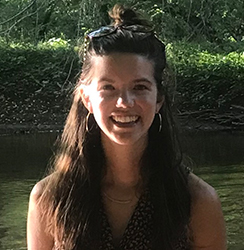 Dr. Sophie Picq is an evolutionary biologist fascinated by how tropical fish communities evolve and diversify. She received her BA&Sc and MSc from McGill University in Canada, her PhD from the Max Planck Research School in Evolutionary Biology in Germany in 2017 and joined MSU’s Integrative Biology Department in 2018 in the lab of Dr. Jason Gallant.
Dr. Sophie Picq is an evolutionary biologist fascinated by how tropical fish communities evolve and diversify. She received her BA&Sc and MSc from McGill University in Canada, her PhD from the Max Planck Research School in Evolutionary Biology in Germany in 2017 and joined MSU’s Integrative Biology Department in 2018 in the lab of Dr. Jason Gallant.
“I have always been interested by tropical aquatic ecosystems and have a deep passion for conducting my work directly in the field. Throughout my career as a biologist, I have had close to ten different research mentors across four different countries. Some of these human interactions have been vital in developing my identity as a scientist by helping me gain confidence in my research abilities and enabling me to feel like I belong in a lifelong career in science. As supportive mentorship has had such a positive impact in advancing my career as a biologist, I now see it as a fundamental part of my job. I have therefore taken an active and intentional approach to develop my mentoring skills by participating in MSU workshops that share effective teaching and mentoring practices in STEM.
These events help me create an evolving mentoring philosophy aimed at cultivating healthy, trusting relationships with students. One of the main reasons I am committed to being an effective mentor is because I strive to be a relatable role model that can help break down barriers to inclusion and diversity that exist in STEM. As a woman, non-native English speaker and foreigner to the US, I hope that students that I mentor can identify with me, not only to reinforce the feeling that regardless of their background they belong to the scientific community, but also to help them envision that a fulfilling career in science is a possible and likely outcome for them.”
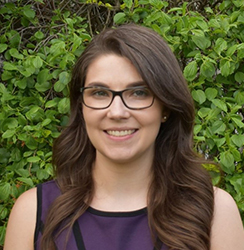 Dr. Christina Reppucci received her PhD from Boston College in 2015, and joined MSU’s Department of Psychology and the Neuroscience Program in 2017 as a Research Associate in the lab of Dr. Alexa Veenema.
Dr. Christina Reppucci received her PhD from Boston College in 2015, and joined MSU’s Department of Psychology and the Neuroscience Program in 2017 as a Research Associate in the lab of Dr. Alexa Veenema.
Dr. Reppucci is acutely aware of the importance of positive role models and mentors, as her own career path was heavily influenced by supportive teachers and mentors. At MSU, Dr. Reppucci has paid this forward through her dedication to providing research opportunities to students; she has served as the primary research mentor to 6 undergraduate students (2 of whom completed senior theses), and has co-mentored 1 graduate student who successfully defended her master’s thesis in January 2021.
Dr. Reppucci aims to provide all her mentees with a well-rounded experience—teaching them not only hands-on technical laboratory, rodent behavioral testing and surgical skills, but also a broader understanding of how these methods work and why they were chosen to address the research questions at hand. This includes descriptions of techniques while they are performed, as well as weekly meetings with her mentees to discuss relevant methodological and primary literature background readings. While discipline-specific skills and knowledge is important, even more so are the higher-order critical thinking and analytical skills she fosters.
Undergraduate mentees are essential contributors to Dr. Reppucci’s research program and are co-authors on a majority of her conference abstracts (10 out 12 from her work at MSU) and peer-reviewed publications (3 out of 4 from her work at MSU). She also encourages her mentees to present their research projects at institutional and national meetings. In sum, Dr. Reppucci has been a co-author on 11 poster presentations first-authored by MSU undergraduates at university-wide symposia (1 student received first prize for her presentation at UURAF 2019), and 2 poster presentations first-authored by MSU undergraduates at national conferences (which is uncommon in her field).
2020
Dr. Murielle Ålund received her PhD from Uppsala University in Sweden in 2017, and joined MSU’s Integrative Biology Department in 2018 as a Swiss NSF Postdoctoral Fellow in the lab of Dr. Janette Boughman. Dr. Ålund understands, first-hand, the impact of quality mentorship and strives to improve her own mentoring skills by following evidence-based best practices described in the literature and by attending courses on these topics. At MSU, Dr. Ålund has mentored 10 students and 4 technicians, and has provided her mentees technical wet lab and field experience, as well as guidance in good scientific and reporting practices. She created a bi-weekly writing group for her mentees that covers scientific publishing from data collection to paper submission, and three of these undergraduate students are currently writing their first scientific publications using results they helped collect and analyze as side projects to her fellowship. When MSU’s University Undergraduate Research and Arts Forum was cancelled this spring due to COVID-19, Dr. Ålund created a new opportunity for her mentees to present in front of a large audience by organizing a BEACON seminar that was broadcast to members of five institutions across the country.
One of Dr. Ålund’s undergraduate mentee’s wrote: “She goes above and beyond to provide resources that she thinks will be beneficial to the research project you are working on, as well as for what you have planned for the next steps in your career”. Another stated: “[S]he has consistently demonstrated her skill, commitment, and passion for mentoring and teaching. It has been an honor to work with her, and it is no exaggeration to say that she has played an integral role in shaping the scientist that I have grown to become. She is an exemplary role model, both to undergraduate researchers and to other mentors, and is highly deserving of this award”.
Dr. Ålund believes that effective mentoring is beneficial at all stages in one’s career. In collaboration with other postdocs in her department, Dr. Ålund recently co-authored a perspective on how to better support the postdoctoral workforce (Ålund, Emery, et al. 2020. Nat Ecol Evol 4, 777–781). This perspective highlighted that an important aspect of supporting the postdoctoral workforce is to enhance the mentoring that postdocs receive during their postdocs positions, as well as provide opportunities for postdocs to serve as mentor for others.
In the words of her supervisor, Dr. Boughman: “[Dr. Ålund] is a mover and shaker. [. . .] Her excellence in mentoring arises from her exceptional commitment to team science, and she places very high value on making sure that scientific team members are engaged, challenged, well trained, and fully recognized for their contributions and achievements”.
Dr. Joseph Hill received his PhD from Penn State in 2016, and joined MSU’s Department of Horticulture in 2017 as a USDA FIGA EWD Postdoctoral Fellow in the lab of Dr. Courtney Hollender. Dr. Hill’s goal as a mentor is to share tools and experience, and he seeks out opportunities to expand his skills and perspective by attending workshops and courses on mentoring and STEM teaching. At MSU, Dr. Hill has intensively mentor 3 undergraduate students (2 of which are about to begin graduate school) and 4 graduate students, and provided more limited guidance to several others. When training students in new techniques, Dr. Hill provides students with background and context, and several options with pros and cons for each, in order to develop the level of understanding that will be needed to troubleshoot inevitable problems.
The graduate students that Dr. Hill mentors wrote: “Joseph has demonstrated a level of professionalism and passion for teaching that outmatches any postdoc we have interacted with at Michigan State University or elsewhere. [. . .] Not just in our lab, but throughout the department, Joseph has a reputation as a go-to resource for help and advice for graduate students”. Dr. Hill has proven to be been a model mentor to the graduate students in his lab. One stated that “[h]e has had a major impact on my graduate career, shaping how I do science, and how I mentor those with whom I work”, while another remarked that “[h]e cultivated the confidence I have today to conduct research independently and his teaching philosophy is central to the one I am currently developing”.
Dr. Hill has also sought out formal teaching opportunities during his postdoc position, serving as a guest lecturer. When COVID-19 forced classes online this spring he quickly adapted his lecture for a virtual classroom. He made several thoughtful and deliberate changes to his normal teaching style to help engage students and improve the online teaching and learning experience. These changes were so well-received that other course instructors came to him for advice on how to implement the same strategies and technologies in their own lectures.
According to his supervisor, Dr. Hollender: “[Dr. Hill] immediately proved to be an exceptionally gifted and dedicated teacher and research mentor for both undergraduate and graduate students. [. . .] I have witnessed it personally, but what is more impressive is that students he has mentored and trained have voluntarily shared that they are grateful to have worked with him, enjoyed the experience, and had a lot of fun in the process”.
2020 marked the first year of the PETMA, and is an opportunity to showcase the significant impact that our postdocs play in the lives of their colleagues, peers and students, not only in the classroom, but in their daily interactions in research, outreach, advising and teaching.




